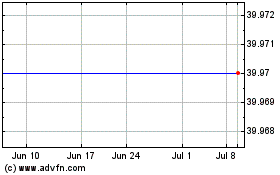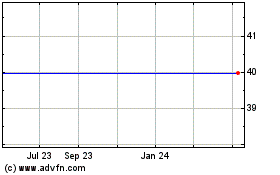By Bailey McCann
When the first robo advisers were launched, the idea was to
offer everyone access to investing. The slick apps offered
ready-made portfolios with minimum investments and account fees as
low as $1 a month, appealing initially to younger investors.
Now, more than a decade later, robo-advising firms have expanded
into other low-cost, accessible financial services as they vie with
each other for clients and try to expand their customer base.
Robo advising has grown to a $600 billion-plus market that
includes cash accounts, financial advice, lending and retirement
services -- attracting a wider variety of investors than ever.
Robo-advising companies including Acorns, Betterment, Personal
Capital and Wealthfront offer cash accounts ranging from basic
checking to high-interest-rate savings accounts, and some offer
debit cards. Investors can set up rules that automatically route
cash into savings goals, investment portfolios and retirement
funds. Acorns, Betterment and Personal Capital also offer
individuals the ability to do basic financial planning.
All these services are low cost. An Acorns cash account, for
example, has no overdraft fees or minimum balances, and it includes
free ATM use.
'Self-driving money'
Wealthfront has gone so far as to say that the robo label is too
limiting for its services. Kate Wauck, a spokeswoman for the
company, says its goal is to offer fully automated finances to
consumers. As a step toward that goal, Wealthfront is launching
what it calls "self-driving money," a suite of services that will
allocate every dollar that comes into an account in accordance with
rules set by the account holder.
When money is deposited in a Wealthfront cash account, the money
can be automatically distributed into bill payments, investments,
loan payments, retirement and savings goals.
Ms. Wauck says a majority of Wealthfront's new customers are
coming in through the cash-account option -- the company doubled
the assets it oversees to $24 billion with the launch of cash
accounts. Customers tend to move into investing later.
Wealthfront's minimum for an investment account is higher than
those of many of its rivals, at $500.
Widening impact
More robo-advising firms are also marketing to investors who say
they want to better align their investing with their values.
Newday Investing offers cash accounts and robo investing,
targeting investors who want to align their portfolios to
sustainability or social-impact goals. Individuals can choose the
impact they want to focus on, and the site will generate a
portfolio that fits. The investment minimum is $100.
Options for investors include a gender-lens strategy, a
sustainable real-estate investment trust and a strategy that
focuses on ocean health. In the future Newday plans to offer
faith-based portfolios.
In addition, Newday's cash account provides sustainability and
impact information on everyday purchases.
On a more personal level, Ellevest, a robo-advising firm that
targets women, has expanded to include career coaching alongside
investment help. Ellevest users can get tips on how to improve
their job prospects and negotiate for higher salaries, as well as
financial planning.
Hybrids draw older investors
Investment minimums for robo-adviser accounts at the
more-established financial firms, like Vanguard Group and Charles
Schwab Corp., can be more than $10,000. For that, investors get
access to more financial advice than the more-accessible services
generally offer, in some cases directly from a human. Investors in
these robo advisers often come over from other business lines at
these firms or from self-directed accounts and include older
investors, in part because of the higher initial minimum
investments.
Vanguard, which has the largest share of the robo-adviser market
at $148 billion, offers a hybrid: automated portfolios with human
advice on issues like investment choices and tax considerations. It
recently started offering an all-digital option, with no human
advice, for a lower fee.
Schwab, which recently acquired TD Ameritrade and its robo
business, is the second-largest robo adviser, overseeing $43
billion. Hybrid services are available, as well as a new feature
that helps investors spend down their retirement accounts
smartly.
Looking ahead, both the newer firms and the more traditional
financial giants are likely to keep expanding what is offered under
the umbrella of robo advisory. Technology provides a low-cost way
to offer an array of services to clients that can help boost
customer loyalty. New entry points like cash accounts can also
serve as a path into investing or other services like lending or
retirement accounts.
Ken Schapiro, president and chief executive of Backend Research,
a service that monitors developments in the robo market, says he
expects cash accounts to be the next frontier for the
more-traditional firms.
Industry estimates suggest that the robo market could top $2
trillion in assets by 2022. Mr. Schapiro says firms are "all in" on
continuing to improve the robo-adviser apps and adding services as
users have come to expect an Amazon.com-like experience. "They're
going to keep pushing the envelope," he says.
Ms. McCann is a writer in New York. She can be reached at
reports@wsj.com.
(END) Dow Jones Newswires
March 08, 2020 23:25 ET (03:25 GMT)
Copyright (c) 2020 Dow Jones & Company, Inc.
TD Ameritrade (NASDAQ:AMTD)
Historical Stock Chart
From Mar 2024 to Apr 2024

TD Ameritrade (NASDAQ:AMTD)
Historical Stock Chart
From Apr 2023 to Apr 2024
